The current scenario in India and Afghanistan shows us that most of the population still lives in rural areas, but the trends are changing rapidly as people migrate towards urban and peri-urban areas. According to the United Nations Department of Economic and Social Affairs (UNDESA), 55% of the world's population is residing in urban areas currently, with the proportion predicted to grow to 68% by 2050 (UNDESA, 2018).
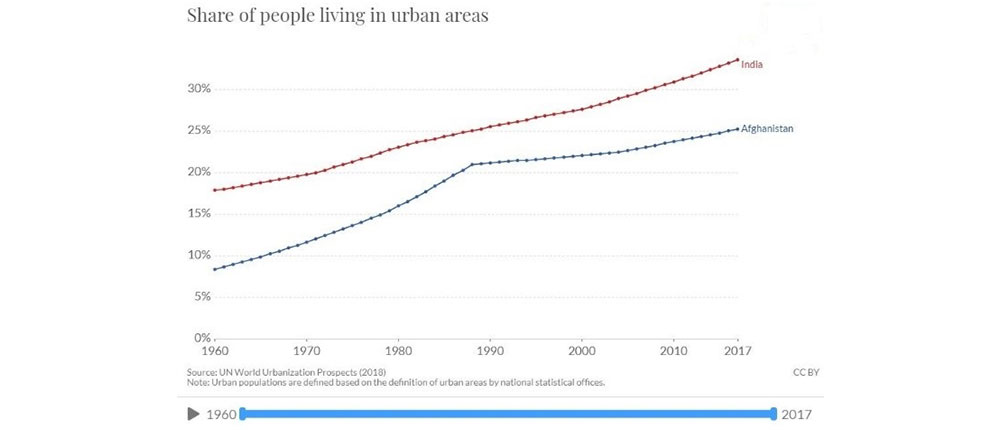
As observed in Figure 1, India's urbanization rate has increased from 17.9% in 1960 to 33.6% in 2017, and similarly, Afghanistan's urbanization rate has increased from 8.4% in 1960 to 25.2% in 2017 (UN World Urbanization Prospects, 2018). Considering that urbanization rates are higher in both countries, sustainable urban development will continue to rely increasingly on effective urban growth and natural resources management. For cities to progress towards urban Sustainable Development Goals (such as SDG 11) and the New Urban Agenda by the United Nations, a pertinent concern is thus to ensure that the urbanization process is more inclusive and pragmatic to address the dynamic needs of the citizens. In alignment with SDG 17 for fostering partnerships, collaborations and knowledge exchange between peers and experts across cities and countries are also imperative for achieving a sustainable urban future.
Insights from TechCamp Mumbai: Designing our Urban Future
Towards the objective of peer-exchange, the U.S. Department of State, TERI and UN-Habitat India organized TechCamp Mumbai: Designing Our Urban Future in July 2019 in Mumbai, India. An initiative of the U.S. Consulate General, Mumbai, the U.S. Embassy Kabul, Afghanistan, and the Bureau of Educational and Cultural Affairs (ECA) – TechCamp Mumbai brought together approximately 40 Indians and Afghans active in urban planning and development to network and learn innovative tech tools to solve urban development challenges common to both countries.
Moving beyond a seminar-mode, the TechCamp was an extensive 3-day collaborative and hands-on workshop where participants interacted with trainers and experts from across the world through a series of training and brainstorming sessions.The TechCamp had a dual objective as it intended to - strengthen people-to-people ties and knowledge exchange among Indian and Afghanistan cities; and provide support and match-making services to the participants for implementing a series of innovative and sustainable urban solutions in their respective countries.
Organizing the impactful event, with decision-makers from both the countries under one roof, provided us with insights on how both countries are facing similar urban challenges, but the scale of these challenges is different based on the local context. For instance, in Mumbai, transportation of waste is a major issue, so the Municipal Corporation of Greater Mumbai (MCGM) is focusing on training the citizens of Mumbai to reduce quantity of waste generation, such as reusing shopping bags and segregating waste at source; whereas in Kabul, the municipality along with other departments are in the process of establishing laws and regulations and improving funding mechanisms for monitoring the process of solid waste management and development of landfill sites.
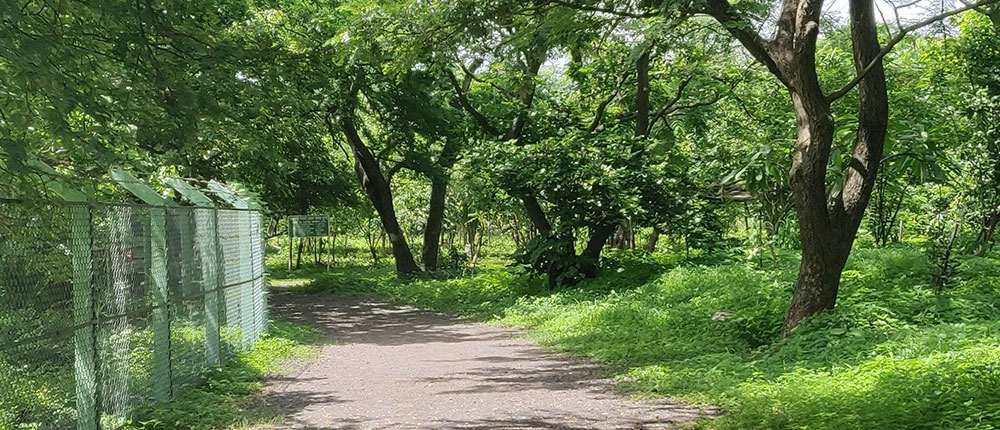
To generate awareness on urban ecology issues and management of pressures of urban growth in the host city of Mumbai, the agenda included a site visit to the Maharashtra Nature Park for the participants (Figure 2). The Nature Park, earlier known as Mahim Nature Park, is situated on the banks of Mithi river close to the Dharavi locality (considered as one of the world's largest slums) and is maintained by the Mumbai Metropolitan Region Development Authority (MMRDA). Once a large dumping ground, the Nature Park has now been converted into a 37-acre man-made natural habitat, covered with more than 14,000 species of vegetation and other varieties of birds, herbs, etc.
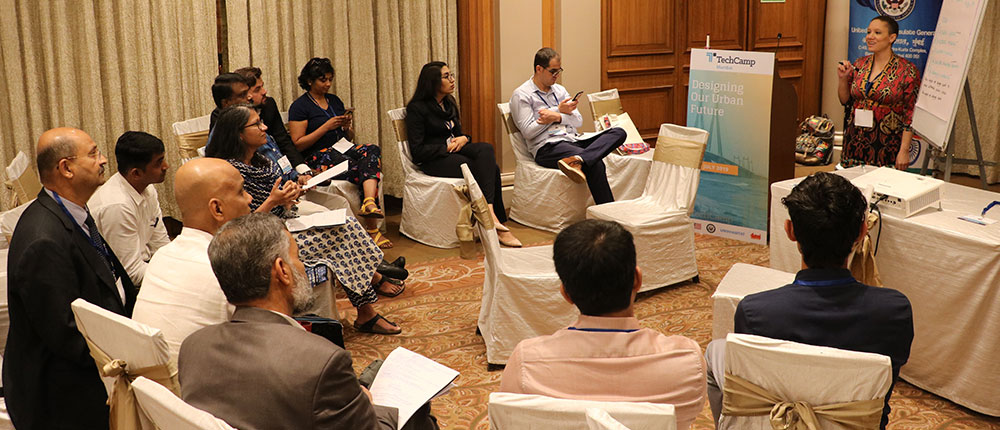
The trainers effectively utilized the group sessions to share the use of creative and user-friendly data management technology and its application to address urban planning challengesin Afghanistan and India (Figure 3). The trainers represented esteemed organizations such as National Democratic Institute (NDI), Institute H21, Accountability Labs, UN-Habitat, Keshif, Municipal GIS Services of United States, National Institute of Urban Affairs (NIUA) and TERI; and shared experiences addressing different facets of urban planning across the world.
A participatory tool that was shared was the KoboToolBox, which is a desktop-to-mobile-to-desktop technology that allows users to design and modify e-forms, filled using mobile devices, that are used for conducting surveys for field-based development projects. Another innovative tool that was discussed was Keshif, which can be utilized for creating data dashboards for planners and researchers that are easy to use for analyses of different indicators towards monitoring performance of projects. The participants, belonging to different levels of policy-making organizations from both countries, showed keen interest in learning the tools and applying it in their respective cities.
Post the training sessions, the participants were divided into groups based on their interests within three main domains of Using Big Data, Engaging Your Community and Tech for Good Governance. The aim was for the participants to utilize the training received at the TechCamp for designing solutions for diverse challenges, such as air pollution, mobility, waste management and present their solutions.Based on the presentations, the juryconsisting of representatives of the partner organizations, identified and highlighted the solutions that ranked high in effectiveness of addressing on-ground realities (Figure 4). For instance, one of the mixed participant groups under the Big Data domain, the ‘Kabune' team, focused on addressing the issue of air pollution in the cities of Kabul and Pune. They jointly developed a framework to address the issue of air pollution through effective collection, management and analysis of data using the KoBo Toolbox.
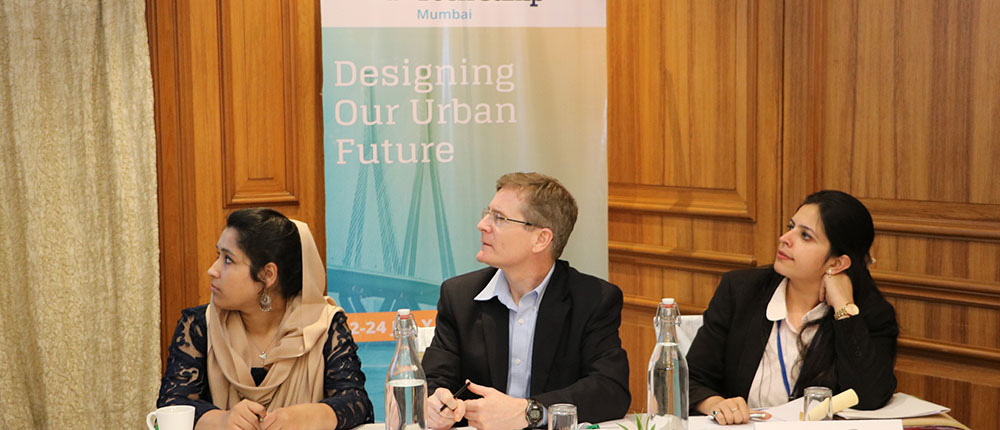
The successful completion of TechCamp Mumbai was thus an overwhelming experience for both the organizers and the participants. To sustain the momentum of this event, Follow-on workshops were conducted in both Mumbai and Kabul in November 2019 for disseminating the training received with a new set of urban practitioners and policymakers.
For more details on TechCamp Mumbai: Click here
Takeaways from Follow-on workshopson Sustainable Solutions for Our Urban Future
For maximum outreach of the program in both countries, parallel Follow-on workshops were conducted in Mumbai and Kabul in November 2019 which engaged a new set of participants along with some of the prior ones. Few participants from TechCamp volunteered to be the moderators for theme discussions at the Follow-on workshops in their respective countries to ensure perpetuity of the training methods and engage in in-depth discussions.
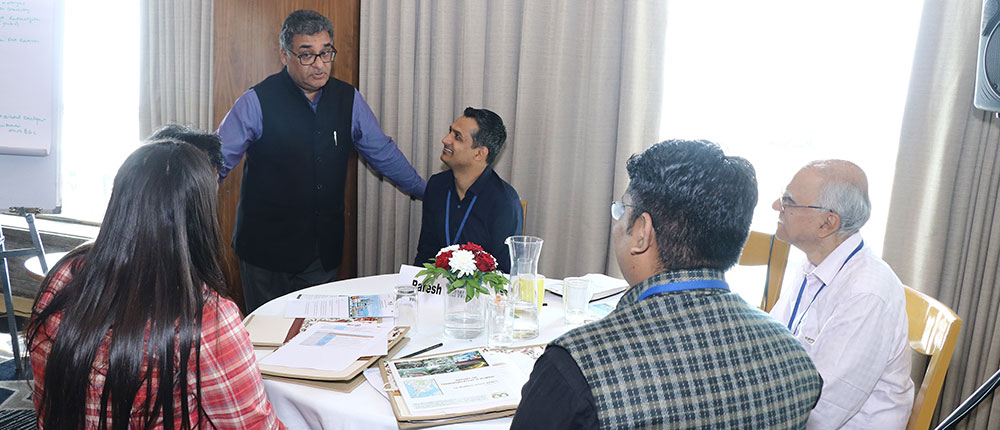
The Follow-on workshops focused on context-specific facets of urban planning that have an impact on the development of cities with comprehensive coverage of national and international policy frameworks, such as the SDGs (Figure 5).In the Mumbai workshop, four themes were identified – Urban Resources and Infrastructure Development, Transportation and Sustainable Mobility,Climate Action and Environment, and Citizen Participation and Social Inclusion. For the Kabul workshop, the themes were – Urban Governance and Public Participation, Data and Mapping for Urban Planning, Economic Growth and Livelihood Protection, and Climate Action and Natural Resource Management. There was also a combined online session between Kabul and Mumbai which provided a platform for the participants to exchange ideas and e-connect on takeaways from both the workshops.
The discussions and the recommendations provided inthe workshops for achieving a sustainable future were documented in an e-Discussion Paper titled Fostering a Sustainable Urban Future. As an outcome of the urban theme discussions held in the two workshops, it highlights the major issues and challenges, the stakeholders involved, the institutional and policy frameworks, the various tools and approaches, and the monitoring and evaluation mechanisms faced by both the countries for developing sustainable solutions.
Urban practitioners from both countries emphasized that there is an urgent need for ecology-based planning strategies that take into consideration the optimal utilization of natural resources. Further, the discussions also focused on the need for environmentally sustainable transport systems and the present scenario of sustainable mobility that has not advanced much in both the countries. One of the major concerns that was raised is the strengthening of Urban Local Bodies (ULBs) in India, and similarly sub-national government departments in Afghanistan for empowering the cities to bridge the urban infrastructure deficits and ensure improved service delivery. Though Indian government has moved forward in using the Public Private Partnership (PPP) model for development and management of infrastructure assets, Afghanistan is still in the early stages of applying the PPP model for economic growth and livelihood protection.
There was a consensus among the participants that there is a need to engage in rethinking of existing urban policy frameworks. For settlements to be inclusive and resilient in the future, it is imperative to have seamless collaboration amongst all verticals of government departments. Unlike many developed countries, India and Afghanistan still face struggles of providing basic services to all and to align with global targets of SDGs. The need of the hour is thus for both the countries to establish monitoring and evaluation mechanisms to improve accountability in implementation strategies. To provoke a sense of ownership of assets and maintenance of services amongst citizens, innovative ways of community engagement also become significant for Indian and Afghanistan cities.
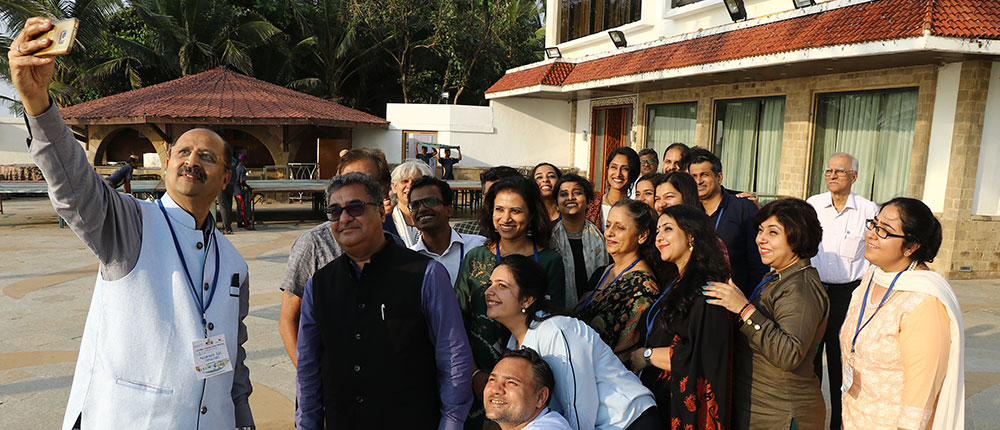
It was encouraging to see how the participants from the previous TechCamp reflected on the issues being discussed and worked towards actively engaging the new set of researchers, policy makers and officials from various state and city-level organizations in developing solutions for sustainable urban growth (Figure 6). The entire process has helped the TERI team to learn from the takeaways of the discussions and actively engage in developing resilient and sustainable settlements in India and Afghanistan. The overall program on sustainable urbanization has subsequently helped in enabling the participants to connect with key local experts, peer organizations from private sector and research/policy institutions and be aware of relevant tools for facilitating handholding and technical support for informed decision-making processes.
For more details on the Follow-on workshops: Click here
